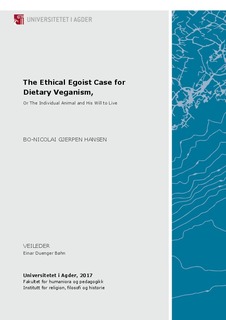| dc.description.abstract | In this thesis in applied ethics, «The ethical egoist case for dietary veganism, or the individual animal and his will to live», I argue that taking non-human animals into consideration can be argued for from an approach of ethical egoism. I argue that from the standpoint of egoism, in most cases you would be well advised to adopt a vegan diet, that means, practically speaking, a diet rid of animal products.
The thesis is divided into four main chapters. The first presents other approaches to animal ethics and the issue of dietary vegetarianism or veganism. I briefly present the standpoints of Peter Singer, Tom Regan and Mark Rowlands. Their approaches are utilitarian, rights based and principle based respectively.
In the second part I present ethical egoism as a model. It differs from the approaches met in the first in that egoism places the emphasis on the moral agent himself and states that his actions should benefit himself. I present mainly some of the thinking of philosophers Max Stirner, Friedrich Nietzsche and Ayn Rand. The version of egoism I end up with is not completely similar to any of them, though especially Stirner and Rand influence it strongly. What you do should further your life and strengthen yourself. This you do by keeping a healthy lifestyle, pursuing what is valuable and taking care of the values you already have. Values can be many things, depending on context and the moral agent’s preferences and strategies. Something is not a value if it damages its possessor more than it benefits her. What is detrimental is a non-value or worthless. An important rule is never to sacrifice, that is giving up a value for something of lesser value or for something worthless to yourself.
In the third part, I present the egoist case for taking animals into consideration and for dietary veganism. People are different, and a given individual might have health issues or allergies that complicate the picture, thus allowing for exceptions. Also, people might differ in what extent they are even able to form attachments to non-human animals or feel empathy for them. For them, living animals are possibly non-values. Many can, on the other hand, be expected to have the capacity for meaningful companionship with non-humans, thus making living animals true values. However, given that the meat of dead animals is unhealthy, something I make a limited case for, and given that the taste of meat can be replicated by vegetable sources, eating meat is a sacrifice, hence immoral according to egoism. For those who are actually able to enjoy the company of living animals, meat production is even more problematic as it is a practice that turns values into worthless products. It turns potential companions to unhealthy food. This leads to the conclusion that supporting this practice by eating meat is immoral according to egoism, as long as there are other options available.
In the fourth chapter I try to anticipate some potential criticisms and responses to these. Most damaging to my argument would be if a moral agent is unable to bond with animals or see their potential value, or if a meatless diet could be shown to be less healthy than one containing meat | nb_NO |

